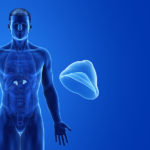By David Blyweiss, M.D., Advanced Natural Wellness
Are you feeling irritable and exhausted? Do you have trouble sleeping? Have you noticed an overwhelming urge to reach for sweet or salty foods? While these symptoms might sound like three separate problems, they’re actually indicators of one very common condition.
Adrenal fatigue is one of those conditions conventional medicine knows very little about. One reason is because of the sheer number of unrelated symptoms that patients can experience, including:
- cravings for salt and/or sugar
- dizziness upon standing
- feeling overwhelmed
- hair loss
- headaches
- impaired cognition, brain fog, lack of concentration
- increased need for caffeine
- insomnia
- intolerance to cold and/or heat
- low blood pressure
- low blood sugar
- low energy levels
- low libido
- muscle and/or joint pain
- recurrent infections
- weight gain
If any of these symptoms sound familiar, you could be suffering from adrenal fatigue. The most common underlying cause is chronic stress or a major stressor like a death in the family or the loss of a job.
Here’s why: Your adrenal glands secrete cortisol and adrenaline, two hormones that kick into high gear during moments of intense anxiety or physical strain. When stress becomes constant, cortisol and adrenaline secretion also becomes constant. Over time, this can deplete your adrenal glands.
I’ve seen so many patients at risk of adrenal fatigue in my practice that I’ve come up with a plan of action to help them prevent and even reverse the condition.
Here’s what I suggest:
Boost your B and C. Vitamins C and B5 are critical for adrenal health.1 Up your vitamin C intake by taking 2,000 mg of C each day. A good way to increase your B5 levels is with a daily vitamin B complex that provides 100 mg of each of the primary B vitamins, including B5.
Kick the caffeine habit. Caffeine overstimulates the adrenals—sometimes to the point that they eventually fail. Tame your caffeine consumption by switching to herbal teas or less-caffeinated, antioxidant-rich green tea.
The World's Quickest Solution for Ending Prostate and Urinary Misery
This has recently been revealed to be one of the only real breakthroughs in prostate health.
The seeds of a strange fruit (sometimes called "Chinese Apples") hold powerful phytonutrients that are a revolution in prostate health.
In fact, UCLA and Veterans Administration research have now proved this to be true.
Not only that, but it may be the worlds quickest solution for ending prostate misery.
Simply stated, these phytonutrients represent a huge step beyond beta sitosterol, saw palmetto, and other phytosterols alone.
Simply click HERE if you want to have fast prostate relief...restful, uninterrupted sleep...no more constant "urges to go"...enhanced virility...and optimal prostate support for life.
Ditch processed foods. When your blood sugar goes up and down in response to eating sugar and refined carbs, your adrenals have to kick in to help your body function. Because the body perceives low blood sugar as a sign of starvation, it turns to the adrenal glands to bring blood-sugar levels back up by pumping out more cortisol and adrenaline. You can help prevent this by eating 6 small meals instead of 3 large ones daily—and make sure they are centered around minimally-processed foods like fresh fruits and vegetables, lean fish and whole grains like oats and quinoa.
Take adaptogenic herbs. Herbs like rhodiola and ginseng help the adrenals produce cortisol in natural patterns. Try taking 170 mg of a standardized rhodiola extract to reduce fatigue and enhance mental focus.2.
You could also try a ginseng extract that supplies at least 1.6 mg of ginsenosides to help your body deal withchronic stress.3
Neutralize your stress. Managing overall stress is key, so try to incorporate tension-melting practices into your daily life. I’ve found that deep breathing, meditation and exercise can all help tame stress. Yoga may be particularly soothing since it’s been shown to help regulate cortisol levels in people experiencing chronic stress.4
References:
- Jaroenporn S. Effects of pantothenic acid supplementation on adrenal steroid secretion from male rats. Biological & Pharmaceutical Bulletin. 2008;31:1205-1208.
- Olsson EM. A randomised, double-blind, placebo-controlled, parallel-group study of the standardised extract shr-5 of the roots of Rhodiola rosea in the treatment of subjects with stress-related fatigue. Planta Medica. 2009;75:105-112.
- Rai D. Anti-stress effects of Ginkgo biloba and Panax ginseng: a comparative study. Journal of Pharmacological Science. 2003;93:458-464.
- Vadiraja HS. Effects of a yoga program on cortisol rhythm and mood states in early breast cancer patients undergoing adjuvant radiotherapy: a randomized controlled trial. Integrative Cancer Therapies. 2009;8:37-46






